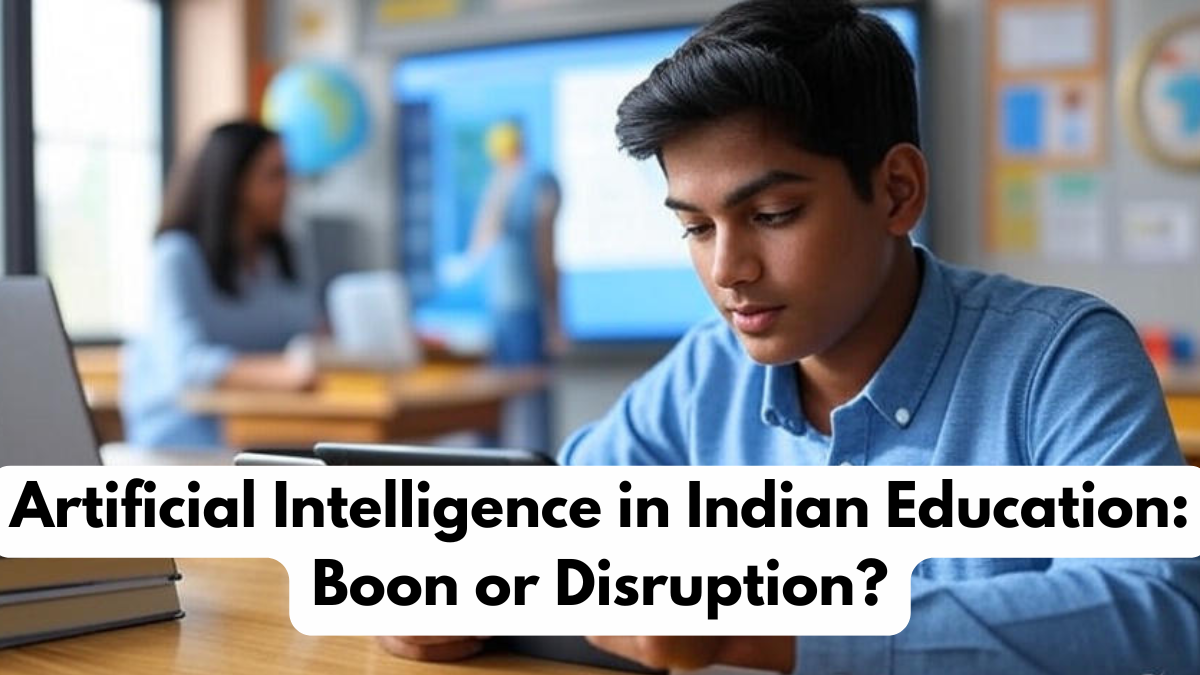AI in education India is rapidly transforming how students learn, teachers teach, and institutions operate. From personalized learning apps to smart classrooms powered by EdTech innovation, technology is redefining the future of education in the country. India’s vast and diverse education system, serving millions of students across urban and rural areas, makes it an ideal space for such technological disruption. However, with opportunity comes concern: Is AI a boon that democratizes learning or a disruption that threatens traditional teaching models?

The Rise of AI in Indian Education
The adoption of AI in education India has accelerated in recent years, particularly after the pandemic-driven shift to digital platforms. Schools, universities, and EdTech companies are leveraging artificial intelligence to improve student engagement, provide adaptive testing, and predict academic outcomes.
Key applications of AI in Indian classrooms include:
- Personalized learning paths tailored to student performance
- Intelligent tutoring systems available 24/7
- Automated grading and administrative support
- Virtual classrooms and immersive simulations
- Career guidance based on AI-driven analytics
These innovations show how EdTech innovation is making education more accessible and tailored to individual needs.
Benefits of AI in Education
The use of AI in education India offers several tangible benefits that can uplift the country’s education sector.
- Accessibility: Students in remote areas can access high-quality learning materials.
- Efficiency: Teachers save time through automated grading and lesson planning.
- Engagement: AI-driven simulations and gamification improve student motivation.
- Data-driven insights: Educators can track learning progress and provide targeted support.
- Personalized learning: Every child can learn at their own pace with the help of adaptive systems.
Together, these benefits highlight how EdTech innovation is shaping a more inclusive and effective education landscape.
Comparing Traditional Education vs AI-Powered Education
The debate around AI in education India often comes down to balancing tradition with technology. Here’s a comparison of both models:
| Feature | Traditional Education | AI-Powered Education (EdTech innovation) |
|---|---|---|
| Teaching Style | Teacher-led, one-size-fits-all | Personalized, adaptive, data-driven |
| Accessibility | Limited to classroom infrastructure | Available online, scalable nationwide |
| Assessment | Periodic exams, manual grading | Continuous assessment, automated evaluation |
| Student Engagement | Passive learning methods | Interactive tools, gamification, smart content |
| Teacher’s Role | Central to instruction and mentoring | More of a facilitator, supported by AI tools |
This comparison shows that while EdTech innovation brings flexibility and inclusivity, it also changes traditional teacher-student dynamics.
Challenges of AI in Education
Despite its potential, the use of AI in education India faces challenges that cannot be ignored.
- Digital divide: Many rural areas still lack internet and device access.
- Teacher adaptation: Not all teachers are trained to use AI-driven tools effectively.
- Equity concerns: Wealthier schools benefit more, widening the education gap.
- Over-reliance on technology: Excessive dependence may reduce critical thinking and human interaction.
- Privacy risks: Student data must be protected from misuse.
Without addressing these issues, EdTech innovation could end up deepening inequalities rather than solving them.
Conclusion
The debate over whether AI in education India is a boon or disruption depends on how it is implemented. When used responsibly, AI can complement teachers, bridge gaps, and enhance learning outcomes. However, if rolled out without proper infrastructure and safeguards, it risks creating a digital divide and undermining the human element of education. A balanced approach, where EdTech innovation supports but does not replace teachers, is the way forward for India’s education future.
FAQs
What is the role of AI in education India?
AI helps personalize learning, automate tasks, and provide data-driven insights to improve education in India.
How does EdTech innovation support learning?
EdTech innovation uses tools like adaptive learning platforms, AI tutors, and gamified apps to enhance student engagement and outcomes.
What are the challenges of AI in education India?
Challenges include digital inequality, teacher training gaps, privacy concerns, and over-reliance on technology.
Can AI replace teachers in India?
No, AI can support teachers but cannot replace the mentorship, guidance, and emotional connection that educators provide.
How does AI benefit students in rural India?
By providing access to digital learning resources and adaptive systems, AI can bring quality education to underserved regions.
Click here to learn more